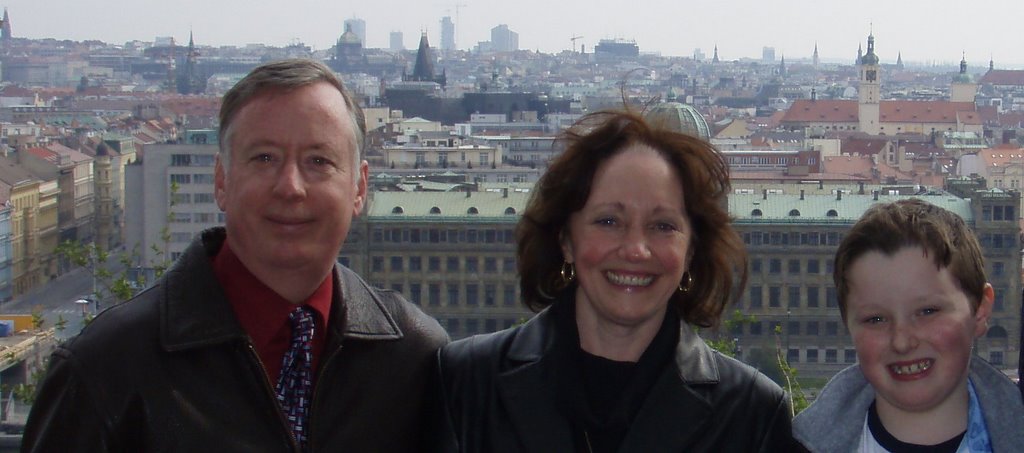Kathy and Noah, but thankfully not me (*knocks wood) have needed the Czech medical system since we moved here over one and a half years ago. While we have found the level of care and service to be generally good, it is not without a good deal of frustration, both due to language barriers and differences in how US and Czech doctors view medical treatment.
Emily Prucha is an American married to a Czech (who we purchased our Ford Mondeo from) and has an article in Friday's Prague Daily Monitor about dealing with the Czech medical system. It's spot on.
Being sick is never fun
By Emily Prucha / Prague Daily Monitor / Published 29 February 2008
I never feel more like a foreigner living in Prague than when I’m sick. The emotion only intensifies when one of my children is under the weather or needs medical treatment. Although we have received excellent care in the Czech Republic, linguistic as well as cultural differences often complicate our doctor visits.
Part of my anxiety is related to the challenges of describing ailments in a foreign language. I have to remember that “throat” and “neck” are simultaneously krk in Czech and then I pantomime my way past unknown vocabulary to a diagnosis. No wonder visiting the doctor can bring on a case of the nerves.
Although I would prefer to avoid going to the doctor, as the mom of two young children finding a pediatrician was one of our first priorities when we moved back to Prague. Luckily, we found a doctor whose office is just a short walk from our apartment. Between regular check-ups, immunization visits, and the occasional illness, I’ve gotten to know our pediatrician (and the route to and from her office) fairly well. Yet, no matter how many times I've been there, and despite my good experiences there, as soon as her nurse calls out “Pruchoví,” (our family name) I feel my palms start to sweat.
Over the past two years, my pediatrician and I have translated names of illness and immunizations, and we’ve compared treatments on a variety of childhood ailments. Although she initially dissuaded me from giving my children some of the non-standard immunizations like pneumococcal, citing it as too expensive, when I explained that it was part of the recommended vaccine set in the US, she agreed to write a prescription for me. When I asked about the possibility of other “non-essential” vaccinations, such as varicella (chicken pox) or the flu shot, that are very common in the US, she just laughed.
Our pediatrician’s theory on vaccinations falls in line with the general Czech medical theory of less-is-better when treating any illness. “Why use the strong antibiotic when the weaker one might work?” one doctor told me. “We like to keep the strong ones in reserve.” While I agree with him that it doesn’t make sense to over-prescribe, especially to children, the wait-and-see theory can be infuriating when dealing with a sick child.
This theory also contradicts my American sensibilities, since I was raised to believe that an antibiotic could treat anything worse than the common cold. I was also raised to believe that about 24 hours after starting an antibiotic, I would be germ-free and could resume my normal activities like school or daycare. When I mentioned taking Anna Lee downtown while she was still taking a round of antibiotics, my husband Radek firmly deterred me. “She’s sick and needs to rest at home,” he proclaimed. It didn’t take much arguing for him to win me over, but I must say that my initial response is to take antibiotics and keep on functioning.
Differences in healthcare systems could explain some cultural differences in diagnosing and treating illnesses. Unlike in the US, where healthcare is privatized and each individual must purchase his own health insurance coverage, the Czech Republic has a national healthcare system where every citizen has the right to health insurance regardless of his financial situation. Traditionally, children have been almost fully covered within the Czech Republic’s system regardless of their parents’ income. However, a recent system overall has instituted a mandatory CZK 30 fee for each regular doctor visit, which jumps to CZK 90 after hours, as well as higher co-payments for prescription medicines. There is some backlash from the public regarding the changes, especially as they pertain to children.
I experienced the new system in effect when my 9-month-old son Oliver ran a high fever over the weekend. Since his fever was at 39 C (102 F) and didn’t respond well to the infant fever-reducer I had at home, we decided to take Oliver to the nearest after hours clinic on Saturday morning. When we arrived at the Kralovské Vinohrady clinic, Radek checked in with the nurse. “Have you paid?” was her first question. She pointed to the parking lot where an automatic machine stood. At first glance, it looked like a parking meter, but in fact, this was machine to pay the doctor's fees. Unfortunately it didn’t take any paper money or even make change from coins. I heard several other people around me also grumbling. I couldn’t tell if they were annoyed that they had to pay or just annoyed that the machine made the procedure so difficult. On the upside the machines kept the nurses from having to change their habits to accommodate the new payment system. Radek left to find a change machine for the CZK 90 in coins that we needed, while I waited with Oliver.
After the pediatrician on duty examined Oliver, he sent us to an ENT specialist for an ear check. We walked the few hundred yards to a different building and were greeted by another nurse asking “Have you paid?” When we showed her our receipt, she accepted it, and since we had paid the higher after hour fee, we were not asked to pay again (that day). Although on a subsequent follow-up visit the following day, I had to pay CZK 90 again, and then on Monday I was required to paid CZK 30 at both offices since it was a regular working day. While the amount we ultimately paid was probably comparable to one regular American co-payment, the procedure of locating exact change and going outside to deposit it into the automatic machine was particularly annoying.
During the various examinations, Radek and I held a screaming Oliver down while the doctors or nurses performed their tasks. While telling us that Oliver had a middle ear infection, the ENT picked up a sharp instrument which he stuck into Oliver’s ear to pierce and drain the infection. The procedure seemed painful and strange to me, although Czech friends who’ve experienced it claimed that it actually releases the uncomfortable pressure. Later, I raised my eyebrows again when neither of the nurses drawing blood from Oliver’s arm wore any gloves. The third time they checked his blood, it actually splashed up into the nurse’s mouth. She rushed to rinse it off, but otherwise carried on as usual.
Over time, I’m getting used to the no-frills approach I encounter from medical professional here, and I believe the doctors and nurses I’ve seen here are as competent as doctors anywhere. Although it’s been harder for me to make a personal connection with my Czech doctors and nurses, but when I recognize this more as a cultural difference than a language shortcoming or a personal affront, it usually helps. But being sick is just not much fun, regardless of the circumstances.
Monday, March 3, 2008
Expats getting sick in the Czech Republic...
Subscribe to:
Post Comments (Atom)


No comments:
Post a Comment